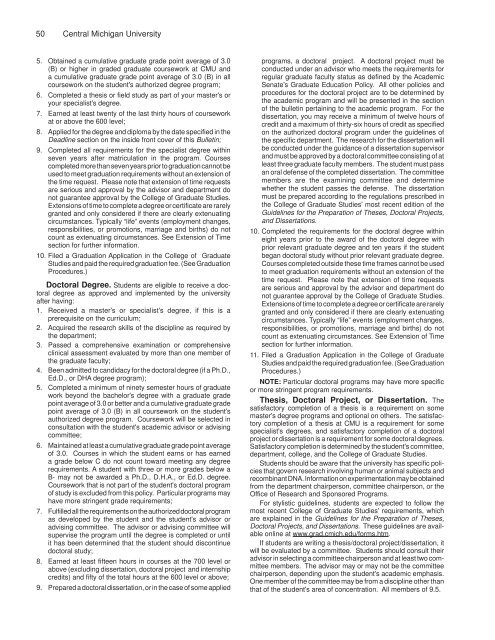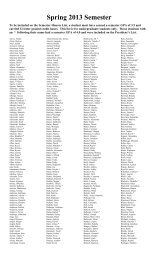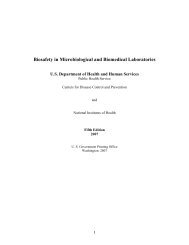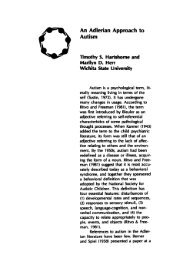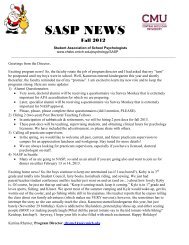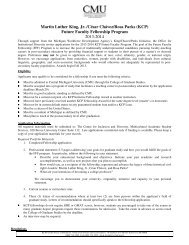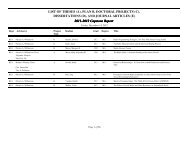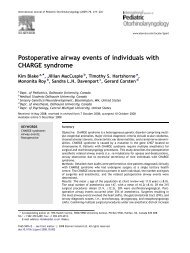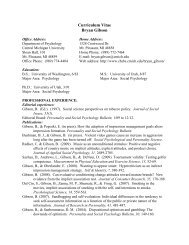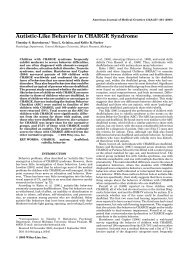Graduate Bulletin - Central Michigan University
Graduate Bulletin - Central Michigan University
Graduate Bulletin - Central Michigan University
You also want an ePaper? Increase the reach of your titles
YUMPU automatically turns print PDFs into web optimized ePapers that Google loves.
50 <strong>Central</strong> <strong>Michigan</strong> <strong>University</strong><br />
5. Obtained a cumulative graduate grade point average of 3.0<br />
(B) or higher in graded graduate coursework at CMU and<br />
a cumulative graduate grade point average of 3.0 (B) in all<br />
coursework on the student's authorized degree program;<br />
6. Completed a thesis or field study as part of your master's or<br />
your specialist's degree.<br />
7. Earned at least twenty of the last thirty hours of coursework<br />
at or above the 600 level;<br />
8. Applied for the degree and diploma by the date specified in the<br />
Deadline section on the inside front cover of this <strong>Bulletin</strong>;<br />
9. Completed all requirements for the specialist degree within<br />
seven years after matriculation in the program. Courses<br />
completed more than seven years prior to graduation cannot be<br />
used to meet graduation requirements without an extension of<br />
the time request. Please note that extension of time requests<br />
are serious and approval by the advisor and department do<br />
not guarantee approval by the College of <strong>Graduate</strong> Studies.<br />
Extensions of time to complete a degree or certificate are rarely<br />
granted and only considered if there are clearly extenuating<br />
circumstances. Typically “life” events (employment changes,<br />
responsibilities, or promotions, marriage and births) do not<br />
count as extenuating circumstances. See Extension of Time<br />
section for further information.<br />
10. Filed a Graduation Application in the College of <strong>Graduate</strong><br />
Studies and paid the required graduation fee. (See Graduation<br />
Procedures.)<br />
Doctoral Degree. Students are eligible to receive a doctoral<br />
degree as approved and implemented by the university<br />
after having:<br />
1. Received a master's or specialist's degree, if this is a<br />
prerequisite on the curriculum;<br />
2. Acquired the research skills of the discipline as required by<br />
the department;<br />
3. Passed a comprehensive examination or comprehensive<br />
clinical assessment evaluated by more than one member of<br />
the graduate faculty;<br />
4. Been admitted to candidacy for the doctoral degree (if a Ph.D.,<br />
Ed.D., or DHA degree program);<br />
5. Completed a minimum of ninety semester hours of graduate<br />
work beyond the bachelor's degree with a graduate grade<br />
point average of 3.0 or better and a cumulative graduate grade<br />
point average of 3.0 (B) in all coursework on the student's<br />
authorized degree program. Coursework will be selected in<br />
consultation with the student's academic advisor or advising<br />
committee;<br />
6. Maintained at least a cumulative graduate grade point average<br />
of 3.0. Courses in which the student earns or has earned<br />
a grade below C do not count toward meeting any degree<br />
requirements. A student with three or more grades below a<br />
B- may not be awarded a Ph.D., D.H.A., or Ed.D. degree.<br />
Coursework that is not part of the student's doctoral program<br />
of study is excluded from this policy. Particular programs may<br />
have more stringent grade requirements;<br />
7. Fulfilled all the requirements on the authorized doctoral program<br />
as developed by the student and the student's advisor or<br />
advising committee. The advisor or advising committee will<br />
supervise the program until the degree is completed or until<br />
it has been determined that the student should discontinue<br />
doctoral study;<br />
8. Earned at least fifteen hours in courses at the 700 level or<br />
above (excluding dissertation, doctoral project and internship<br />
credits) and fifty of the total hours at the 600 level or above;<br />
9. Prepared a doctoral dissertation, or in the case of some applied<br />
programs, a doctoral project. A doctoral project must be<br />
conducted under an advisor who meets the requirements for<br />
regular graduate faculty status as defined by the Academic<br />
Senate's <strong>Graduate</strong> Education Policy. All other policies and<br />
procedures for the doctoral project are to be determined by<br />
the academic program and will be presented in the section<br />
of the bulletin pertaining to the academic program. For the<br />
dissertation, you may receive a minimum of twelve hours of<br />
credit and a maximum of thirty-six hours of credit as specified<br />
on the authorized doctoral program under the guidelines of<br />
the specific department. The research for the dissertation will<br />
be conducted under the guidance of a dissertation supervisor<br />
and must be approved by a doctoral committee consisting of at<br />
least three graduate faculty members. The student must pass<br />
an oral defense of the completed dissertation. The committee<br />
members are the examining committee and determine<br />
whether the student passes the defense. The dissertation<br />
must be prepared according to the regulations prescribed in<br />
the College of <strong>Graduate</strong> Studies' most recent edition of the<br />
Guidelines for the Preparation of Theses, Doctoral Projects,<br />
and Dissertations.<br />
10. Completed the requirements for the doctoral degree within<br />
eight years prior to the award of the doctoral degree with<br />
prior relevant graduate degree and ten years if the student<br />
began doctoral study without prior relevant graduate degree.<br />
Courses completed outside these time frames cannot be used<br />
to meet graduation requirements without an extension of the<br />
time request. Please note that extension of time requests<br />
are serious and approval by the advisor and department do<br />
not guarantee approval by the College of <strong>Graduate</strong> Studies.<br />
Extensions of time to complete a degree or certificate are rarely<br />
granted and only considered if there are clearly extenuating<br />
circumstances. Typically “life” events (employment changes,<br />
responsibilities, or promotions, marriage and births) do not<br />
count as extenuating circumstances. See Extension of Time<br />
section for further information.<br />
11. Filed a Graduation Application in the College of <strong>Graduate</strong><br />
Studies and paid the required graduation fee. (See Graduation<br />
Procedures.)<br />
NOTE: Particular doctoral programs may have more specific<br />
or more stringent program requirements.<br />
Thesis, Doctoral Project, or Dissertation. The<br />
satisfactory completion of a thesis is a requirement on some<br />
master's degree programs and optional on others. The satisfactory<br />
completion of a thesis at CMU is a requirement for some<br />
specialist's degrees, and satisfactory completion of a doctoral<br />
project or dissertation is a requirement for some doctoral degrees.<br />
Satisfactory completion is determined by the student's committee,<br />
department, college, and the College of <strong>Graduate</strong> Studies.<br />
Students should be aware that the university has specific policies<br />
that govern research involving human or animal subjects and<br />
recombinant DNA. Information on experimentation may be obtained<br />
from the department chairperson, committee chairperson, or the<br />
Office of Research and Sponsored Programs.<br />
For stylistic guidelines, students are expected to follow the<br />
most recent College of <strong>Graduate</strong> Studies' requirements, which<br />
are explained in the Guidelines for the Preparation of Theses,<br />
Doctoral Projects, and Dissertations. These guidelines are available<br />
online at www.grad.cmich.edu/forms.htm.<br />
If students are writing a thesis/doctoral project/dissertation, it<br />
will be evaluated by a committee. Students should consult their<br />
advisor in selecting a committee chairperson and at least two committee<br />
members. The advisor may or may not be the committee<br />
chairperson, depending upon the student's academic emphasis.<br />
One member of the committee may be from a discipline other than<br />
that of the student's area of concentration. All members of 9.5.


